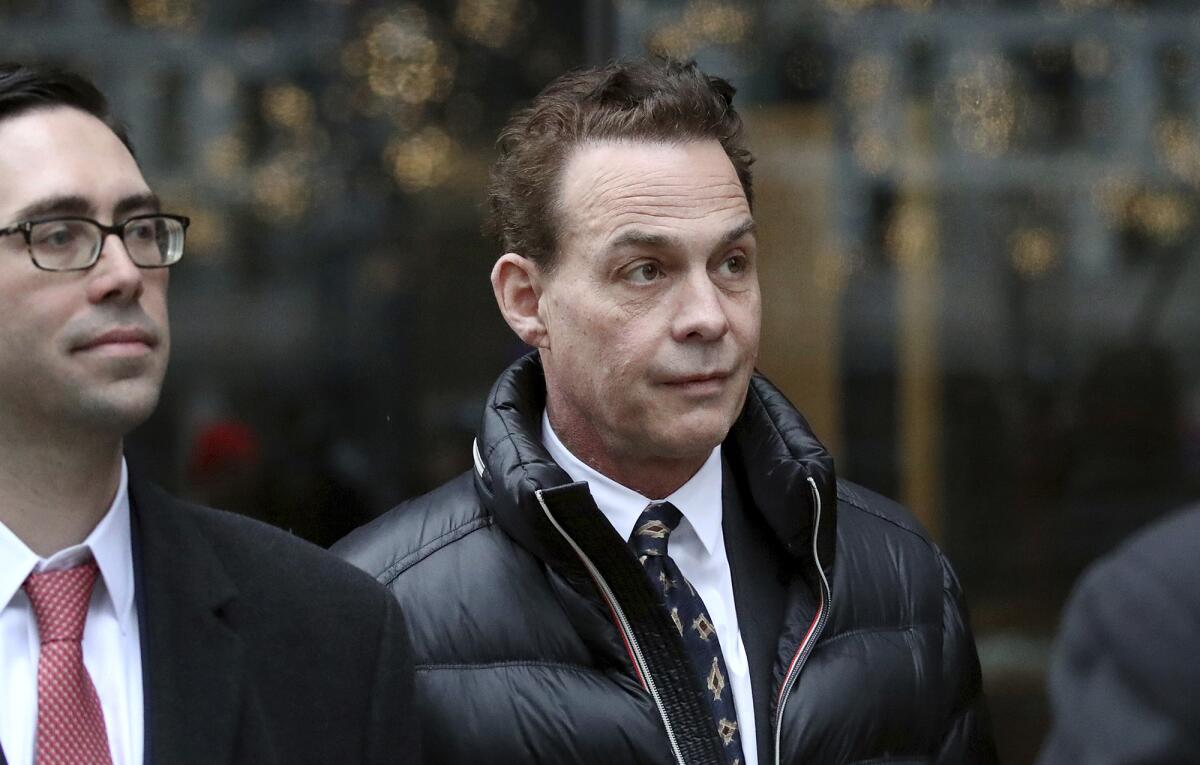Judge orders USC to disclose sensitive admissions records, in victory for parent accused in scandal

A judge on Tuesday ordered USC to turn over sensitive internal documents to Robert Zangrillo, a Miami investor charged with securing his daughter’s admission to the school through fraud and bribery.
The ruling by U.S. Magistrate Judge Page Kelley was a victory for Zangrillo, whose defense hinges on the theory that USC routinely shunts the children of donors and prospective donors into a “VIP” pool of applicants, who are more likely to be admitted than students who apply through the standard process.
Kelley’s order offered a glimpse of a legal duel that has played out largely in secret, litigated in sealed court papers and at closed-door hearings. At issue, according to the judge’s 19-page order, are spreadsheets that tracked VIP applicants and 20 emails between university officials discussing admissions decisions and the lobbying that went into them by donors, trustees and other influential figures within the USC community.
For Zangrillo and other parents charged with defrauding USC, the contested documents could play a central role in a defense their attorneys have already begun floating: that USC could not have been swindled by parents who routed money to university coffers and, in exchange, expected their children would be admitted, if this was precisely the practice endorsed by the school’s administration.
Kelley ordered USC to turn over the spreadsheets and emails, without redactions, to Zangrillo’s legal team.
USC said in a statement it is “reviewing the decision in detail and deciding next steps, including whether to appeal.”
The university has cooperated with prosecutors and the courts, a spokeswoman said, and made “every effort to provide information, including to the defendants.” The documents were redacted to protect privacy, “not to withhold any pertinent information,” she added.
Zangrillo’s daughter, Amber, was endorsed as a “VIP” by Donna Heinel, a former administrator in USC’s athletics department, despite not being an elite athlete, prosecutors allege. Zangrillo, in turn, paid $200,000 to William “Rick” Singer, the Newport Beach consultant who arranged the deal, and $50,000 to a USC account overseen by Heinel, according to prosecutors.
Heinel, who was fired after her arrest last March, has pleaded not guilty to conspiring to commit racketeering, fraud and bribery. Singer has pleaded guilty to four felonies and is cooperating with the government.
Zangrillo’s attorney, Martin G. Weinberg, acknowledged at a hearing in November that despite Heinel’s imprimatur, Amber Zangrillo was not a gifted athlete. In fact, Weinberg said, her “entire application was saturated with information that would demonstrate to any admissions department this is not a world-class athlete.”
But “counterintuitive” as it may seem, he said, USC’s athletics department often “advocates for many students through the VIP process, knowing that these are not athletes.” In August, Weinberg made public documents and emails he had received from the U.S. attorney’s office in Boston, showing USC employees took into account donations, pledges of donations and the occupations of applicants’ parents when flagging them as “VIP” or “special interest.”
Kelley, the judge, said at a status conference last week that based on documents she has seen, it was “a viable assertion” to say USC admitted students as athletic walk-ons in exchange for donations.
Prosecutors say that despite the fact Amber Zangrillo was ultimately admitted as a “VIP,” not a recruited athlete, her father believed she was being fraudulently presented to the school as a gifted rower and her application said as much. They pointed to a phone call, intercepted on a wiretap, in which Singer tells Robert and Amber Zangrillo he was putting the girl forward “as though she’s been sculling and rowing.”
Zangrillo’s $50,000 payment to Heinel may have gone to a university account and not her own pocket, prosecutors say, but the money was nevertheless a bribe that induced her to support an applicant who otherwise would not have been admitted. Zangrillo, Singer and Heinel conspired, their argument goes, to rob USC of Heinel’s honest employment.
Kelley said at last week’s status conference “that’s going to be something for the jury to decide.”
“It’s not de facto a bribe,” she continued. “The school has to be ignorant of that, and one might well ask, how could the school have been ignorant of that?”
USC had previously provided Zangrillo copies of the documents that Kelley ordered disclosed on Tuesday, but with redactions, citing laws that shield student privacy and proprietary information. Weinberg insisted he needed to know the names of certain VIP applicants and the people who had advocated for their admission to show “many other students were admitted in similar or even nearly identical circumstances to [Zangrillo’s] daughter,” he wrote in a filing quoted in Kelley’s order.
“They don’t get to argue, well, this might embarrass, you know, a sponsor or donor,” Weinberg said at the November hearing. He also indicated he wants to interview some of the people referenced in the documents.
“If I could find witnesses whose experience matches Mr. Zangrillo’s experience,” he said, “I at least could, you know, attempt to produce that witness and have them testify.”
More to Read
Sign up for Essential California
The most important California stories and recommendations in your inbox every morning.
You may occasionally receive promotional content from the Los Angeles Times.










